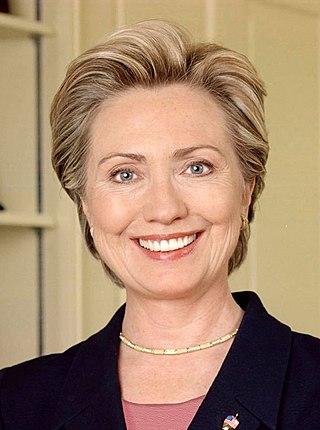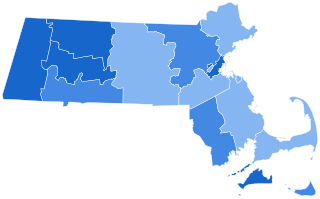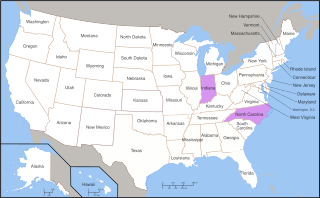
Each of the 50 U.S. states, the District of Columbia, and territories of the United States holds either primary elections or caucuses to help nominate individual candidates for president of the United States. This process is designed to choose the candidates that will represent their political parties in the general election.

The 2008 United States presidential election was the 56th quadrennial presidential election, held on November 4, 2008. The Democratic ticket of Barack Obama, the junior senator from Illinois, and Joe Biden, the senior senator from Delaware, defeated the Republican ticket of John McCain, the senior senator from Arizona, and Sarah Palin, the governor of Alaska. Obama became the first African American to be elected to the presidency, as well as being only the third sitting United States senator elected president, joining Warren G. Harding and John F. Kennedy. Meanwhile, this was only the second successful all-senator ticket since the 1960 election and is the only election where both major party nominees were sitting senators. This was the first election since 1952 in which neither the incumbent president nor vice president was on the ballot, as well as the first election since 1928 in which neither ran for the nomination.

Super Tuesday is the United States presidential primary election day in February or March when the greatest number of U.S. states hold primary elections and caucuses. Approximately one-third of all delegates to the presidential nominating conventions can be won on Super Tuesday, more than on any other day. The results on Super Tuesday are therefore a strong indicator of the likely eventual presidential nominee of each political party.
In American politics, a superdelegate is a delegate to a presidential nominating convention who is seated automatically.

From January 3 to June 3, 2008, voters of the Democratic Party chose their nominee for president in the 2008 United States presidential election. Senator Barack Obama of Illinois was selected as the nominee, becoming the first African American to secure the presidential nomination of any major political party in the United States. However, due to a close race between Obama and Senator Hillary Clinton of New York, the contest remained competitive for longer than expected; neither candidate received enough pledged delegates from state primaries and caucuses to achieve a majority, without endorsements from unpledged delegates (superdelegates).

The 2008 Iowa Democratic presidential caucus occurred on January 3, and was the state caucuses of the Iowa Democratic Party. It was the first election for the Democrats of the 2008 presidential election. Also referred to as "the First in the Nation Caucus," it was the first election of the primary season on both the Democratic and Republican sides. Of the eight major Democratic presidential candidates, then-U.S. Senator Barack Obama of Illinois received the most votes and was ultimately declared the winner of the Iowa Democratic Caucus of 2008, making him the first African American to win the caucus and the first African American to win a primary state since Jesse Jackson in 1988. Former U.S. Senator John Edwards of North Carolina came in second place and then-U.S. Senator Hillary Clinton of New York finished third, though Clinton received more delegates than Edwards. Campaigning had begun as early as two years before the event.

Super Tuesday 2008, Super Duper Tuesday, Mega Tuesday, Giga Tuesday, Tsunami Tuesday, and The Tuesday of Destiny are names for February 5, 2008, the day on which the largest simultaneous number of state U.S. presidential primary elections in the history of U.S. primaries were held. Twenty-four states and American Samoa held either caucuses or primary elections for one or both parties on this date. Furthermore, the week-long Democrats Abroad Global Primary began on this day.
The results of the 2008 Democratic Party presidential primaries are the detailed outcomes of a series of contests by which members of the United States Democratic Party chose their candidate for the 2008 U.S. presidential election. The contests are held in each of the fifty U.S. states, as well as the District of Columbia, Puerto Rico, American Samoa, Guam, the U.S. Virgin Islands, and Democrats Abroad. The Northern Mariana Islands was the lone U.S. state or territory which did not have a primary or caucus election in 2008. The outcomes include totals of delegates selected as well as popular votes.

The 2008 Michigan Democratic presidential primary took place January 15, 2008. Originally, the state had 156 delegates up for grabs that were to be awarded in the following way: 83 delegates were to be awarded based on the winner in each of Michigan's 15 congressional districts while an additional 45 delegates were to be awarded to the statewide winner. Twenty-eight unpledged delegates, known as superdelegates, were initially able to cast their votes at the Democratic National Convention in Denver, Colorado.

The 2008 Oklahoma Democratic presidential primary, part of the process of selecting that party's nominee for President of the United States, took place on February 5, one of the many nominating contests of 2008's "Super Tuesday". The primary election chose 38 pledged delegates to represent Oklahoma at the 2008 Democratic National Convention. The remainder of Oklahoma's 47 delegates consisted of unpledged superdelegates not bound by the results of the primary. The election was a closed primary, meaning that only registered Democrats could vote in this election. Hillary Clinton won the primary by a significant margin.

The 2008 Florida Democratic presidential primary took place on January 29, 2008. Originally, the state had 185 delegates up for grabs that were to be awarded in the following way: 121 delegates were to be awarded based on the winner in each of Florida's 25 congressional districts while an additional 64 delegates were to be awarded to the statewide winner. Twenty-five unpledged delegates, known as superdelegates, were initially able to cast their votes at the Democratic National Convention.

The 2008 Illinois Democratic presidential primary took place on Super Tuesday, February 5, 2008, with 153 delegates at stake. Each of Illinois's 19 congressional districts was proportionally allocated to candidates who had received 15% or more of the vote in that district, totaling 100. Another 53 delegates were also proportionally allocated to candidates who had received 15% or more of the vote statewide. The 153 delegates represented Illinois at the Democratic National Convention in Denver, Colorado. Thirty-two other unpledged delegates, known as superdelegates, also attended the convention and cast their votes as well.

The 2008 American Samoa Democratic presidential caucuses took place on February 5, 2008, also known as Super Tuesday. Caucusing began at 11:00 am local time. The early time ensured that results would be reported that evening in the mainland United States. Hillary Clinton won the caucus, the smallest of Super Tuesday's nominating contests.

The 2008 North Carolina Democratic presidential primary took place on May 6, 2008, one of the last primary elections in the long race for nomination between Barack Obama and Hillary Clinton. Obama won the primary.

The 2008 United States presidential election in Massachusetts took place, as in all 50 states and D.C., as part of the 2008 United States presidential election of November 4, 2008. Voters chose 12 representatives, or electors to the Electoral College, who, in turn, voted for the office of president and vice president.

The 2008 United States presidential election in South Carolina took place on November 4, 2008, and was part of the 2008 United States presidential election. Voters chose eight representatives, or electors to the Electoral College, who voted for president and vice president.

The 2008 United States presidential election in New Hampshire took place on November 4, 2008, as part of the 2008 United States presidential election throughout all 50 states and D.C. Voters chose four representatives, or electors to the Electoral College, who voted for president and vice president.

This article contains opinion polling by U.S. state for the 2016 Democratic Party presidential primaries. For currency and accuracy, please note the specific dates for each polling as listed below. For the significance of the earliest state votes, the Iowa caucuses and the New Hampshire primary, see United States presidential primary – Iowa and New Hampshire. To know when any given state votes, see the timeline of primaries and caucuses.

Presidential primaries and caucuses were organized by the Democratic Party to select the 4,051 delegates to the 2016 Democratic National Convention held July 25–28 and determine the nominee for president in the 2016 United States presidential election. The elections took place within all fifty U.S. states, the District of Columbia, five U.S. territories, and Democrats Abroad and occurred between February 1 and June 14, 2016.

The 2016 United States presidential election was held on November 8, 2016, as part of the 2016 General Election in which all 50 states plus the District of Columbia participated. South Carolina voters chose electors to represent them in the Electoral College via a popular vote pitting the Republican Party's nominee, businessman Donald Trump, and running mate Indiana Governor Mike Pence against Democratic Party nominee, former Secretary of State Hillary Clinton and her running mate, Virginia Senator Tim Kaine.
















